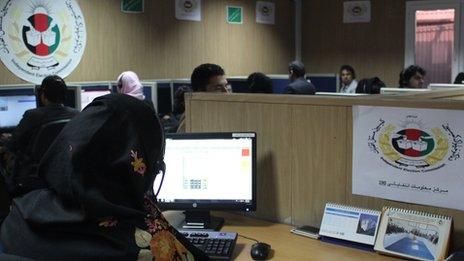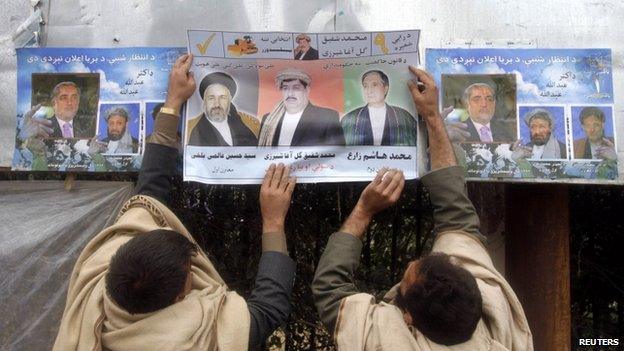Afghan notebook: Bomb-proof call centre
- Published

Call centre staff guide voters through the 2014 elections
A group of telephonists are working in tightly packed rows of desks at a secret location in Kabul, taking calls from all around the country.
A young woman in a headscarf asks the name and district of a caller. So far so unremarkable, but this is a call centre with a difference.
"Sometimes we receive calls from the Taliban," she tells me, "they call to tell us that there should be no election."
Welcome to Afghanistan's "190" election hotline.
Around 60 staff, juggling computer, mouse and headphones provide an everyday information service, from 07:00 in the morning to 20:00 at night advising on everything you need to know about the crucial 2014 presidential and provincial polls.
The Taliban have threatened the election and everyone associated with it, so the building where they work is secured by guards and blast walls.
Symbols
Qais Safi, one of the mostly young workers manning the phones says that callers usually have practical questions.
"People ask how they can get voting cards, who the presidential candidates and their deputies are, what symbols they use and what number they are on the polling papers."

Campaigning has already begun for elections due in April that will mark the start of a new chapter
Because two-thirds of Afghans are thought to be illiterate, the logos chosen to identify candidates during the campaign and on ballot papers are important, and include anything from an oil lamp to a bulldozer.
The call centre staff have been trained for three days, with more workshops to follow as the campaign unfolds.
Syed Baryali Shuaib, the head of the centre, says they get 5,000 to 6,000 calls every day, and expects numbers to rise. But only 10% of callers are female.
The Election Commission has other means to reach voters too: it produces TV and radio slots and installs roadside billboards.
And in a country with almost 20 million mobile users, SMS texts have become as important as messages read out in mosques after Friday prayers.